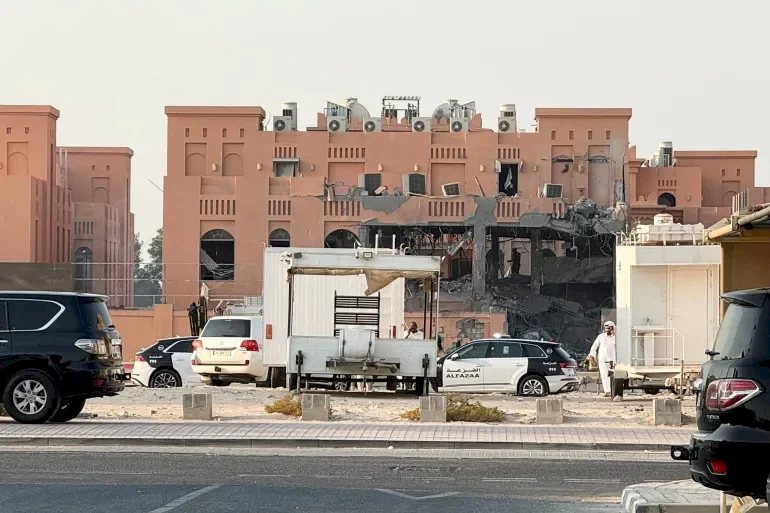
With the President's Participation: An Emergency Arab-Islamic Summit in Doha Today to Discuss the Israeli Attack on Qatar
SadaNews - An emergency Arab-Islamic summit is being held in Doha today, Monday, to discuss the response to the unprecedented Israeli attack that targeted Hamas officials in the Gulf state last week, which has long distanced itself from direct conflicts in the region and played a mediating role.
The meeting comes amid widespread international condemnation of the Israeli attack, particularly from the wealthy Gulf states that are allies of the United States, Israel's main supporter, in an effort to take a collective stance.
Ilham Fakhro, a researcher at the Middle East Initiative at Harvard University's Kennedy School, stated that this summit "essentially serves as a mechanism for the Gulf Cooperation Council countries to show their unity at a time when Israel has directly targeted the sovereignty of a member state, in the first such attack in history."
Fakhro, who is the author of a book on the "Abraham Accords" through which Arab countries normalized their relations with Israel, added that "Gulf countries are expected to use the summit to call on Washington to rein in Israel, especially after its strikes on Qatar have undermined efforts for a ceasefire that Tel Aviv has not shown serious commitment to."
On Sunday, the foreign ministers of Arab and Islamic countries held a closed preparatory meeting in Doha to discuss a draft statement to be presented to leaders for a unified decision.
The summit places Qatar, which has played a prominent role in mediating between Israel and Hamas to halt the war in Gaza over the past two years, in a politically critical test regarding its future role in the Palestinian issue. Qatar has repeatedly hosted indirect negotiation rounds between the two parties, which have failed to reach a lasting solution, apart from two temporary truces.
Sanctions on Israel
In this context, Karim Bitar, a researcher at the Institute of Political Studies in Paris, viewed this summit as a real test for all participating Arab and Islamic countries. "It's time to move beyond the usual recitations, verbal condemnations, and traditional mutual accusations," he said.
Bitar added that "people in the Arab world and the Global South in general are fed up with the old classic statements of condemnation and denunciation."
He continued that "what they expect today is for these countries, despite their differences on many issues, to send a significant signal not only to Israel but also to the United States, indicating that the time has come for the international community to stop granting Israel this 'blank check' and to reconsider this blind and unconditional support, ideally starting a process of imposing sanctions on Israel."
Leaders in Doha are expected to discuss a wide range of options, as observers fear that ongoing escalation could undermine any prospects for resuming negotiations for a ceasefire in Gaza.
Double Standards
On Sunday, the Qatari Prime Minister urged the international community to stop "applying double standards," arguing that "what encourages Israel to continue in this approach is the silence, or rather the incapacity of the international community to hold it accountable."
Bitar noted that "there is now a recognition that the threat is existential, affecting not only the Palestinian and Lebanese peoples but almost every country. The United States alone has enough influence to push Israel to change its behavior and engage in behavioral modification, but the United States will not do so unless it feels that its old allies in the Gulf are exerting pressure on it to do so."
Qatar hosts the largest U.S. military base in the region and mediates in the war between Israel and Hamas in Gaza alongside the United States and Egypt.
In the summit scheduled for today, Monday, Iran confirmed the participation of its President, Massoud Bezhkishan, and Iraq confirmed the participation of Prime Minister Mohammed Shia al-Sudani. The Turkish Presidency also confirmed that President Recep Tayyip Erdoğan will attend the summit, while Palestinian Authority President Mahmoud Abbas arrived in Doha on Sunday evening.
On the eve of the summit, Palestinian factions sent a message to the attendees calling for "decisive stances" and "the use of all Arab pressure cards, including activating the joint defense agreement, utilizing oil as a weapon, and imposing comprehensive Arab sanctions on the occupying state."
Turkish Foreign Minister Hakan Fidan told Al Jazeera on Sunday that "the biggest problem now is the expansion of Israel in the region," adding that "after defining the problem in this way, Arab and Islamic countries should come together to find a solution to this problem."

Report: Trump May Order Attack on Iran Next Sunday

Trump: Iran Wants to Reach an Agreement.. and Knows the "Deadline"

Shaath: Rafah Crossing will be opened in both directions starting next Monday

America Imposes Sanctions on Several Iranian Officials Including the Interior Minister

CENTCOM: An American Fighter Jet Departed the Lincoln Carrier for Routine Flights in the A...

Report Warns: Iran is Weary but Still 'Deadly'

Israeli Supreme Court Postpones Again Review of the Appeal Against Anti-UNRWA Laws

